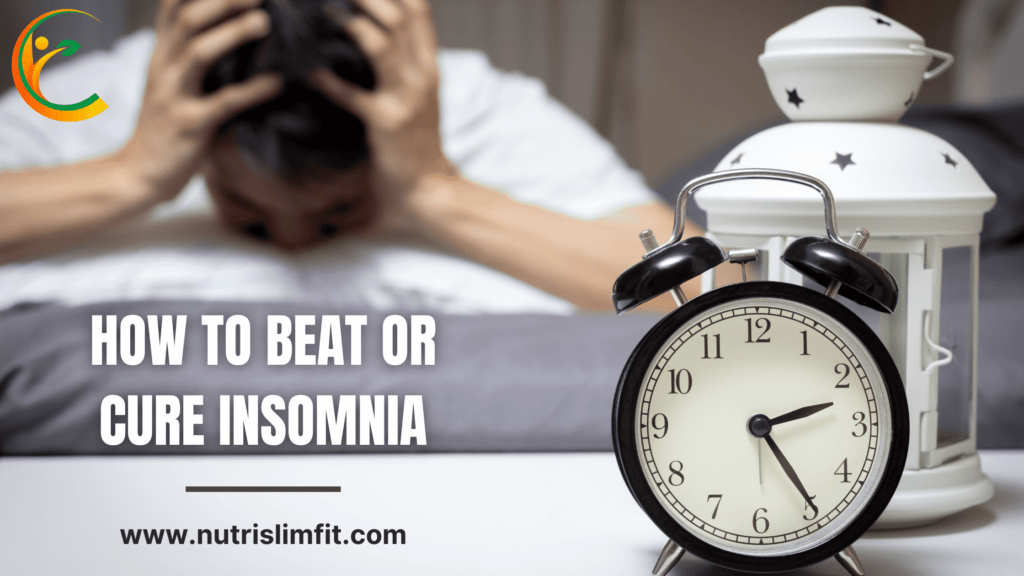Do you stare at the ceiling night after night unable to sleep? Do thoughts race through your mind when you want to unwind? Does worry or chronic pain make it hard to fall or stay asleep? If you struggle with insomnia, you’re not alone. Over 30% of people face occasional sleeplessness while 10% grapple with chronic insomnia. Read until the end to Beat or Cure Insomnia

The good news is insomnia can be overcome in most cases with lifestyle changes, therapy approaches, and sometimes medication. This guide covers all aspects of beat or cure insomnia holistically – understanding causes, self-help tips, treatment options, and prevention strategies for long-term sleep success. Let’s get started.
What is Insomnia?
Insomnia refers to consistent dissatisfaction with sleep quantity or quality despite adequate opportunity to sleep. People with insomnia have trouble initiating or maintaining sleep. They may experience early morning awakenings with an inability to return to sleep.
Insomnia symptoms include:
- Difficulty falling asleep at night – lying awake for longer than 30 minutes
- Waking up frequently during the night
- Awakening too early in the morning
- Feeling unrefreshed after a night’s sleep
- Daytime fatigue, low energy, sleepiness
- Problems with focus, memory, depression
Occasional insomnia lasting a few days does not constitute a sleep disorder. Chronic insomnia with symptoms 3 nights per week for over a month may indicate a more serious issue needing medical attention. Let’s explore what prevents sound slumber.
Common Causes of Insomnia
Insomnia arises from a complex interplay of biochemical, neurological, psychological, and medical factors. Identifying the root cause is key to selecting suitable treatment approaches for better sleep.
Mental Health Issues
Psychiatric conditions like depression, anxiety, bipolar disorder, PTSD, and schizophrenia often coexist with severe insomnia. Treating the underlying condition improves sleep quality. Talk therapy aids coping while psychiatric medications help normalize brain chemical imbalance.
Chronic Stress
Work, relationship worries, financial pressures, or traumatic events can cause hyperarousal activating the fight-or-flight response before bed. Respiration rate, heart rate, and metabolism remain elevated preventing rest. Address sources of stress during daytime via counselling, social support, time management, and self-care activities.
Chronic Pain/Discomfort
Conditions causing persistent pain like arthritis, neuropathy, migraines, cancer pain, back aches or menstrual cramps prevent falling asleep and continuity. Treating pain through therapies, lifestyle changes, pain medications, supplements, acupuncture, heating pads or topical gels and creams enhances comfort for better sleep.
Circadian Rhythm Disorders
Traveling across time zones plus irregular sleep schedules alters the body’s internal 24-hour clock governed by natural light/dark exposure. Resetting the biological clock by exposing oneself to daylight early morning and avoiding light at night helps synchronize the clock. Also stick to consistent bed/wake timings.
Sleep Disorders – Many sleep disorders like restless leg syndrome, periodic limb movement disorder, sleep apnea disturb sleep continuity. Overnight testing in a sleep lab confirms these allowing specific treatment like CPAP or leg massagers.
Medications
Stimulants for ADHD or asthma, steroids, decongestants, some antidepressants and blood pressure drugs interfere with sleep as side effects. Doctors can adjust drug choice or timing. Avoid OTC medication misuse – it disturbs sleep quality if taken beyond dosage guidelines or addiction sets in.
Poor Sleep Hygiene
Activities impeding sleep include late-night exercise, looking at screens emitting blue light from devices before bedtime, irregular sleep schedules, napping during the day, excessive alcohol at night plus consuming beverages with caffeine.
Certain foods also disrupt sleep – heavy spicy foods stimulating digestion, high sugar foods which raise blood sugar later dropping it rapidly during sleep causing awakenings for some.
Improving sleep hygiene supports high-quality slumber through simple lifestyle tweaks promoting healthy, consistent sleep. Let’s explore those next.
Sleep Hygiene Tips
Optimizing sleep conditions, routines and habits constitutes the first line to beat or cure insomnia, before considering medications or therapy. Enhancing sleep hygiene alone helps many overcome insomnia sustainably by supporting the body’s natural sleep mechanisms. Key measures include:
Maintain a consistent sleep schedule – try to go to bed and wake up at the same time daily even on weekends to set body’s clock
- Limit daytime naps to 30 minutes before 3 pm
- Avoid vigorous exercise 2-3 hours before bedtime
- Create optimal sleep environment – cool, pitch dark, and quiet bedroom for uninterrupted nighttime rest
- Invest in comfortable mattresses and bedding facilitating easier sleep onset
- Limit exposure to screens emitting blue light before bed – install apps reducing blue light on devices
- Reduce evening caffeine, alcohol, and heavy meals
- Relax through yoga/breathing exercises/music/reading before bed
- Only use the bedroom for sleep and intimacy so mind associates the room with sleep
- Handle worries before bed via journaling
- Seek bright light exposure in the morning and daytime to set circadian rhythm
Such basic enhancements to daily routines, food habits and sleep spaces form the foundation of insomnia treatment before considering medicinal intervention. Now let’s get into medical treatment options for insomnia.
Medical Treatments for Insomnia
Those struggling with chronic insomnia despite good sleep hygiene may need added medical therapies for adequate relief. Standard treatment options include to beat or cure insomnia is as follows:
Cognitive Behavioural Therapy for Insomnia (CBT-I)
This psychotherapeutic approach helps change negative thought patterns plus unrealistic sleep expectations that intensify insomnia through techniques like –
Sleep Restriction – limiting time spent awake in bed to consolidate sleep drive
Stimulus Control – using bedroom only for sleep and intimacy
Cognitive Restructuring – addressing irrational beliefs about sleep needs
Relaxation Training – to reduce performance anxiety about sleep
Biofeedback – guides control of stress physiology
CBT-I enhances motivation to implement behaviour changes improving sleep long after therapy ends making it the first-line treatment method.
Sleep Medications
Doctors may prescribe short-term medications like sedatives, hypnotics, orexin antagonists, and melatonin receptor agonists to reduce sleep onset latency and wakefulness for acute insomnia. The potential for abuse and tolerance limits the usefulness for chronic insomnia. Appropriate medication facilitates rapid sleep onset while allowing natural awakening.
Light Therapy
Exposure to bright light therapy in the mornings can help reset circadian rhythm while avoiding night-time light from gadgets, allowing consolidated night-time sleep. Light boxes and light visors are available emitting 10,000 lux mimicking natural daylight and supporting the body clock.
Acupuncture
This traditional Chinese technique uses ultra-thin disposable needles inserted at specific bodily points enhancing sleep by altering melatonin production among other mechanisms. Systematic reviews support acupuncture for insomnia without adverse effects.
Integrating suitable medical therapies with stellar sleep hygiene boosts treatment effectiveness for stubborn insomnia. We shall now consider prevention tips to minimize future insomnia recurrences.
Preventing Insomnia Recurrence
While occasional transient insomnia affects everyone, chronic long term insomnia requires active prevention efforts to avoid relapse after initial treatment. Helpful proactive measures include:
Cultivate Consistent Sleep Patterns
Regulate sleep-wake cycle by sleeping and rising at the same timings daily irrespective of weekdays or weekends. Equally important – avoid daytime napping or limit to 30 minutes. This strengthens sleep drive enhancing night-time rest.
Exercise Daily
Regular physical activity reduces stress hormone levels, tires out the body and aligns circadian rhythm allowing better sleep. However, complete workouts 2-4 hours before bedtime giving time to cool down since exercise raises body temperature impeding sleep initially.
Ensure Adequate Daytime Sun Exposure
Spending time outdoors especially early in the day helps synchronize the body’s sleep-wake cycle via natural daylight. Daytime sun exposure enhances melatonin release at night critical for good sleep.
Limit Caffeine, Alcohol and Nicotine
Avoid caffeine close to bedtime about 5-6 hours pre-sleep optimally since it’s a stimulant. While alcohol makes people drowsy initially, it fragments sleep later at night. Nicotine is a potent stimulant detrimental for sleep, so quit smoking.
Unwind Before Bedtime via Routine
Devote 30-60 minutes pre-sleep to relax through favoured activities like reading, gentle music, light stretches, skin care regimen or meditation habitually. This cues the mind it’s time to wind down for bed.
Optimize Sleep Environment
From bedroom temperature, bed softness, light control via blackout curtains to white noise for blocking disruptive sounds – customize environmental factors promoting rapid sleep initiation. Earplugs, sleep masks and weighted blankets also aid some people via sensory blocking or swaddling sensations.
Keep Sleep Diaries
Monitoring insomnia patterns, sleep hygiene consistency, lifestyle triggers, diet and interventions used via daily logs spotlights what works or needs troubleshooting. Sleep diaries boost motivation plus accountability minimizing insomnia recurrence.
Seek Therapy for Enduring Issues
Unresolved trauma, anxiety, depression, chronic pain and grief can disrupt restful repose for months. Psychotherapy facilitates mind-body wellness while teaching coping techniques preventing future insomnia relapse. Maintain gains through support groups or apps.
Strategically optimizing health behaviours around sleep, managing stress and ensuring daytime balance sustains an insomnia-free lifestyle after treatment. Having covered a wide range of evidence-backed techniques helping overcome insomnia, let’s conclude with actionable takeaways.
Conclusion
Insomnia is difficulty falling or staying asleep affecting 30% of people temporarily and 10% chronically
It arises from mental health woes, chronic pain, circadian issues, medications or poor sleep habits
Enhance sleep hygiene through bedroom, diet and lifestyle optimizations
Seek CBT therapy, light therapy, acupuncture and medications if essential
Prevent relapse by regularizing sleep patterns, reducing stimulant intake, and managing stress
Insomnia is a common but conquerable sleep disorder through disciplined lifestyle regimens, therapeutic interventions and proactive relapse prevention. Paying attention to good sleep hygiene, managing health conditions disturbing sleep and maintaining consistency in sleep timings offers the surest protection against and beat or cure insomnia recurrence. Rest easy, dream big!


